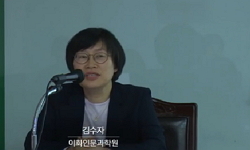이 글은 20세기 후반 한국 사회에서 ‘여성 지식인’이라는 주체 입장을 가지고 ‘자생 이론’적 작업을 행했던 이효재와 조한혜정의 글쓰기가 지닌 수행적 의미에 대해서 규명해보고자 했...
http://chineseinput.net/에서 pinyin(병음)방식으로 중국어를 변환할 수 있습니다.
변환된 중국어를 복사하여 사용하시면 됩니다.
- 中文 을 입력하시려면 zhongwen을 입력하시고 space를누르시면됩니다.
- 北京 을 입력하시려면 beijing을 입력하시고 space를 누르시면 됩니다.

전망으로서의 여성과 여성 지성의 ‘자리’ : 이효재와 조한혜정의 글쓰기를 중심으로 = The prospect of women and the position of women’s intelligence : focused on Lee Hyo-Chae’s and ChoHan Hae-Jeong’s writings
한글로보기https://www.riss.kr/link?id=A107799089
- 저자
- 발행기관
- 학술지명
- 권호사항
-
발행연도
2020
-
작성언어
-
-
주제어
이효재 ; 조한혜정 ; 여성 지식인 ; 자생 ; 自生 ; 이론 ; 또 하나의 문화 ; 수행성 ; Lee Hyo-Chae ; ChoHan Hae-Jeong ; female intellectual ; selfsustaining theory ; Alternative Culture ; performativity
-
등재정보
KCI등재
-
자료형태
학술저널
-
수록면
215-247(33쪽)
- 제공처
-
0
상세조회 -
0
다운로드
부가정보
국문 초록 (Abstract)
이 글은 20세기 후반 한국 사회에서 ‘여성 지식인’이라는 주체 입장을 가지고 ‘자생 이론’적 작업을 행했던 이효재와 조한혜정의 글쓰기가 지닌 수행적 의미에 대해서 규명해보고자 했다. 이효재는 ‘여성의식’이 ‘민족의식’과 호환될 수 있는 것으로, 조한혜정은 여성의 ‘자기 언어’를 갖기 위한 노력이 문화적 식민을 극복하는 ‘자생(自生)’의 노력에 유추될 수 있는 것으로 본다는 점에서 현실 인식과 여성이 말해지는 방식에 있어 차이점을 보여줬다. 하지만 두 여성 지식인의 글쓰기를 교차시켜 살펴볼 때 두 여성 지식인은 집단적 여성의 주체성을 호명하며 여성의 정치적 역능을 증명하려고 했다는 점에서 공통점을 지니고 있었다. 20세기 후반 두 여성 지식인이 제기했던 한국 사회에 대한 ‘전망’은 ‘여성’이라는 전망이었다. 이는 여성(혹은 여성 지성)의 ‘자리’를 만들기 위한 시도이기도 했다. 두 여성 지식인의 글쓰기는 여성이 사회에 있게 하기 위한 ‘수행’의 몸짓이었다는 점에서 그 자체가 정치적 역능을 지닌 것이었다.
다국어 초록 (Multilingual Abstract)
This article tried to clarify the performative meaning of the writings of Lee Hyo-Chae and ChoHan Hae-Jeong, who worked on the theory of spontaneousness in the Korean society in the late 20th century. Lee Hyo-Chae said that ‘women's consciousness’...
This article tried to clarify the performative meaning of the writings of Lee Hyo-Chae and ChoHan Hae-Jeong, who worked on the theory of spontaneousness in the Korean society in the late 20th century. Lee Hyo-Chae said that ‘women's consciousness’ could be compatible with ‘national consciousness’. ChoHan Hae-Jeong said that efforts to have women's ‘A language of One’s Own’ could be inferred from ‘self-sustaining’ efforts to overcome cultural colonization. In this regard, the difference between reality perception and the way women are spoken is shown. However, when looking at the writings of two female intellectuals, the two female intellectuals had a common point in that they tried to prove the political power of women by calling on the collective identity of women. The prospect of Korean society raised by two female intellectuals in the late twentieth century was that of women. It was also an attempt to create a ‘position’ for women. The writing of two female intellectuals was political in itself, in that it was a gesture of ‘perform’ for women to be in society.
동일학술지(권/호) 다른 논문
-
20세기 초 황해도 옹진군(甕津郡) 도서주민(島嶼住民)의 생활 양태-1905년도 옹진군(甕津郡) 남면(南面) 창린도호적(昌麟島戶籍) 자료의 분석 사례-
- 인하대학교 한국학연구소
- 임학성 ( Lhim Hak-seong )
- 2020
- KCI등재
-
- 인하대학교 한국학연구소
- 정홍영
- 2020
- KCI등재
-
‘언표’로서의 내면-1990년대 문학사의 비판적 재구성을 위한 예비적 고찰들-
- 인하대학교 한국학연구소
- 강동호 ( Kang Dong-ho )
- 2020
- KCI등재
-
- 인하대학교 한국학연구소
- 임지현 ( Im Ji-hyun )
- 2020
- KCI등재




 KCI
KCI KISS
KISS






